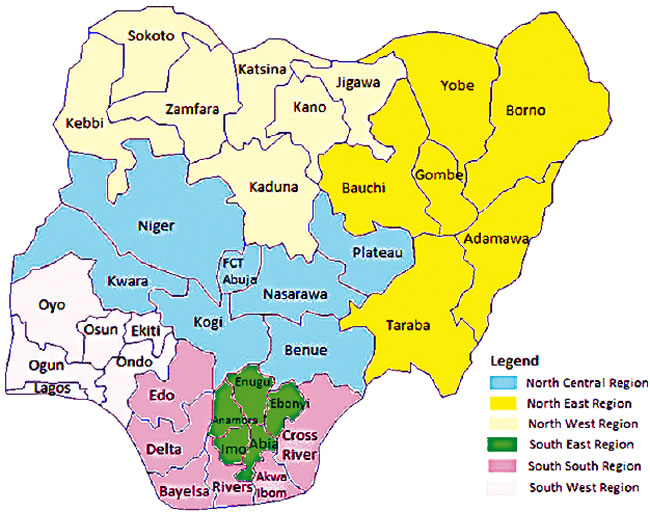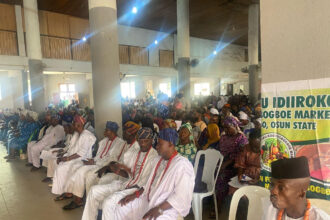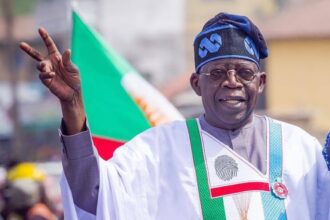With some criminal elements among Fulani herders seemingly becoming an army of occupation in other parts of the country, other ethnic nationalities in the country appear on edge, reports KUNLE ODEREMI
When the late Ozzidi King, Sonny Okosun, in 1977, waxed the album with the title: Papa’s Land, with the catchy teaser: ‘who owns the land’, he had Africa at the heart of his lyrics. The world celebrated musician was presumptuous that such fundamental question was a settled matter in his native country, Nigeria, having gained independence in 1960 from the British almost effortlessly. Okosun was particularly concerned about the strangled hold of southern Africa by colonialists.
About 45 years after the revolutionary singer breathed his last, his beloved country is still at a crossroads on the question of ‘who owns Nigeria?’ Virulent activities of armed Fulani herders, the burgeoning neocolonialists, have provoked serious reflection and curiousity among the more than 250 ethnic groups, with over 400 linguistic ones as ownership of the country. From the tradition of bearing sticks, bow and arrow, the herders now move about with highly sophisticated weapons, including the deadly AK-47 guns even in cities for cattle grazing. Being in possession of lethal arms has further emboldened the herders to become a veritable army of occupation, sacking locals from their ancestral homes and deploying cattle to devour arable crops. Heinous crimes such as mass murder, assassination, kidnapping and banditry have become their stock-in-trade. Vital statistics will suffice here. In Benue, Plateau, Kaduna, Anambra, Enugu, Oyo, Ekiti, Ondo and Kogi states, their activities have left many homes grieving: it is blood, tears and sorrow scenario. Beyond trying to annex Igangan in Ibarapa and parts of Oke-Ogun in Oyo State, as well as attempting to create fiefdoms, herders have become chief tormentors, killing, raping and subjecting Yoruba in their home soil to all forms of other dehumanising experiences.
Various reports assert that the violent activities of the herders escalated in 2018. A report by Amnesty International (AI) claimed that more than 2,000 people were killed, far more than those killed by the Boko Haram terrorists. The organisation blamed the ugly trend on the government’s failure to investigate and prosecute the attackers. Worst-hit by the killings seems to be the Middle Belt region, where people have had to adopt extra ordinary preemptive measures to checkmate the criminal elements and to protect their ancestral roots from marauding herders since the authorities appear helpless. A few states introduced regulatory legal means to check the menace of the armed herders wreaking havoc on their farmlands. For example, in November 2018, the Benue State government introduced the anti-grazing law. The herders became more vicious with their victims accusing the authorities of compromise. Amnesty International even cited a case in Adawama State, where officials in Bang village placed a series of calls to police and other security officials based on intelligence about an impending attack by lurking armed men. According to the body, the village soon came under a heavy attack from the gang, leaving 33 residents dead and hundreds of houses destroyed.
Reports by local and international organisations reflect an astronomical rise in killings about three years ago, with some bodies blaming lethargy by the authorities for the trend. “The Nigerian authorities’ failure to investigate communal clashes and bring perpetrators to justice has fuelled a bloody escalation in the conflict between farmers and herders across the country, resulting in at least 3,641 deaths in the past three years and the displacement of thousands more,” AI said in a statement. According to the AI, of the 310 attacks recorded between January 2016 and October 2018, 57 per cent were in 2018. “These attacks were well-planned and coordinated, with the use of weapons like machine guns and AK-47 rifles,” Osai Ojigho, Amnesty’s Nigeria director, said. “Yet, little has been done by the authorities in
terms of prevention, arrests and prosecutions, even when information about the suspected perpetrators was available,” she said. No fewer than 86 people were reportedly killed in a chained attack in Plateau State and 72 massacred at the wake of the implementation of anti-grazing laws in Benue.
In the south eastern part of the country, armed herders have infiltrated the farmland and rural communities, and unleashed terror on the natives. Enugu and Ebonyi states are most-hit by the killings and destruction such that people have been forced to leave their ancestral homes. All these have led to curious questions among other Nigerians on the overall agenda of the invasion and occupation by the internal oppressors? Is it a combination of economic, political, ethno-religious and cultural issues?
The increasing mergence of the army of occupation, some observers opined, is reportedly bolstered by utterances and actions of a few government officials on the atrocities of the herders against other ethnic nationalities in well-defined geographic location, historical land ownership, presence and spread. The critics, who allege highhandedness on the matter, often refer to when the northern youths demanded that the Igbo quit the North or face dire consequences. They queried: how many of those that issued the threat were arrested by the authorities? When northerners resident in Ile Ife, Osun State, were involved in a violent clash with the locals, how many northerners were arrested like their Yoruba counterparts that were rounded up and taken to Abuja and hounded into detention for prosecution? Who is behind the high-handedness that attended the clash between the locals and herders that have continued to kill, maim and occupy the lands of locals in Benue State and refused to obey a law properly initiated and enacted to control and regulate cattle grazing in the state?
Is Nigeria still a commonwealth?
Who owns Nigeria? Is it a commonwealth with all the components having an equal stake in its affairs? Is it a quasi- patrimony, with one tribe perpetuating political hegemony and dictating the terms of co-existence? As president, Chief Olusegun Obasanjo was unsparing in dealing decisively with a few disgruntled members of the Oodua Peoples Congress (OPC) for stepping beyond their bounds. He was brutal against the people of Zaki-Biam over the gruesome murder of soldiers on peace operation in their land. Obasanjo did not hesitate to pounce on belligerent elements in Igbo land like the Bakassi Boys and deviants in the South-South for threatening state security. He refused to abdicate his function as the key state actor for non-state actors to go berserk and attempt to appropriate the country for their ethnic tribes. In all those scenarios, the body language of Obasanjo was unmistaken to every Nigerian: that his belonging to everyone was not in doubt, as even most of those that despised him while in power were his kinsmen, the Yoruba. After all, there are three largest ethnic groups: Hausa, Yoruba and the Igbo. The trend was not such that groups such as the Miyetti Allah Cattle Breeders Association becoming the alter ego of the state, almost running a blind eye to the excesses of the few bad eggs within what is a strictly private business cartel. According to observers, when state actors shirk in their responsibility, there is bound to be a vacuum to be filled by non-state actors as possible messiahs, thus raising questions about the status of the state.
Access to land
The hue and cry over the directive issued by the governor of Ondo State, Mr Rotimi Akeredolu, that herders should quit forest reserves within seven days brought to the fore three fundamental issues: status of governor as the chief security officer of his state; debate over the classification of business of herders and authority and control over land matters. Quite germane is that many Nigerians are not conversant with the powers of governor over land. The Land use Act clearly states that the governor of a state is the sole institution entrusted with land. He holds it in trust for the people of the state. The provision of the law, in Chapter 202 of the laws of Nigeria 1990 states: “An Act to vest all Land compromised in the territory of each State (except land vested in the Federal government or its agencies) solely in the Governor of the State , who would hold such Land in trust for the people and would henceforth be responsible for allocation of land in all urban areas to individuals resident in the State and to organisations for residential, agriculture, commercial and other purposes while similar powers will with respect to non urban areas are conferred on Local Governments.(27th March 1978) Commencement. Subject to the provisions of this Act, all land comprised in the territory of each State in the Federation are hereby vested in the Governor of that State and such land shall be held in trust and administered for the use and common benefit of all Nigerians in accordance with the provisions of this Act. Therefore, it amounts to a breach for anyone to encroach in a forest reserve without the express permission or through his agent as provided in the Land Use Act.
Did the herders secure permits to enter the forest, as virtually all locals know that those places constitute a no go-areas, even for them as natives? Are the herders aware of the provisions of Section 42(1) (e) and (g) of the Forestry Law Cap 56 Laws of Ondo State 2006 which provides that “Whoever in any forest reserve, except with the authority in writing of the prescribed officer digs, cuts, turns or cultivates the soil or makes a farm or plantation; pastures cattle or permits cattle to trespass or trespasses in any part of forest reserves.” Anyone that breaches the provision “shall be prohibited by an order of the governor or during any period specified in an order of the governor shall be liable on summary conviction as the court may impose or to imprisonment for five years or more or to both.” Were Miyetti Allah leaders aware of the relevant laws but chose to promote illegality and threaten the peace and abuse the benevolence of its landlord? Isn’t the body aware of the Trade Cattle Tax Law of Ondo State? And since ignorance is no excuse in law, no one has the freedom of movement over other people’s property, which in this case, is the governor as the custodian of the land.
A Senior Advocate of Nigeria (SAN), Mallam Yusuf Ali, gave a constitutional insight into land ownership in the country. According to him, “Any land within each state of the federation is given in trust of the governor for the citizens of the state. So, technically speaking, it means the land in the state belongs to the governor and somebody who owns something has a right to determine the use of that thing. If truly, the Land Use Act had vested all the lands in the state to the state government, then the governor has the right to determine how the land would be used, who may have access; who may not have access.” His position was corroborated by another legal luminary, Mr Ebun Olu-Adegboruwa (SAN), who advised “all governors to take hold of their territories and safe guard the lives and property of people.” A former president of the Senate, Dr Bukola Saraki, has added his voice to the necessity for law and order, with a warning against a body language suggestive of compromise in official quarters. For leading human rights lawyer, Mr Femi Falana, the law should be respected, just as he expressed serious reservation on the Federal Government’s approach on the directive issued by Akeredolu to herders to vacate the forest reserves and register for proper documentation.
It might appear exaggerated what Sunday Adeyemo, popularly called Sunday Igboho, said on Monday while featuring on a private local FM station in Osogbo, the Osun State capital, about the current pervasive tension and apprehension in the South-West. He noted: “We shall no longer live like slaves on our land. Many of our people who are abroad can’t come home because their security is not guaranteed.” But many citizens in the South-West believe that he failed to add that majority of his kinsmen at home, especially in the cities could no longer visit their ancestral homes because of the fear of the criminal elements among the herdsmen. Will the law be enforced to end the riddle over the ownership of Nigeria triggered by the criminal elements among herders?
YOU SHOULD NOT MISS THESE HEADLINES FROM NIGERIAN TRIBUNE
We Have Been Forced To Pay About N50m Ransom, Ibarapa Community Cries Out
INDIGENES of Igangan community in Ibarapa North Local Government Area of Oyo State, on Sunday, recounted how they had been forced to pay about N50 million in ransom for wanton cases of kidnapping in the area. Beyond being victims of kidnapping, the residents of Ibarapa communities also recounted regular experience…
Insecurity In South-West: OPC Issues Warning, Backs Akeredolu, Igboho
Oodua People’s Congress (OPC) on Sunday threw its support for the Ondo State governor, Mr Rotimi Akeredolu (SAN), pledging to assist him in enforcing the deadline issued to herdsmen to vacate forest reserves in the state, just as it cautioned the presidency and the Arewa Consultative Forum…
MONDAYLINES: Fulani In Yoruba Forest
Even if you feed on tortoise’s head, you should weep reading this young man’s tribute to his dad who was recently murdered by Fulani herdsmen on his farm: “I remember one of our last conversations, I told you I had lost every hope in Nigeria and how I don’t see it becoming better in another 50-100 years…
EDITORIAL: Akeredolu’s Quit Notice And Buhari’s Govt Defence Of Killer Herders
IF there was any doubt left in the minds of Nigerians that the Muhammadu Buhari administration places more premium on the lives of Fulani herdsmen than any other lives in the country, such an illusion was violently shattered last week. First, in an unprecedented, crude and criminal assault on the sensibilities…
Threats Of Reprisal Attack Against South-West: ACF, Miyetti Allah Are Jokers ― Gani Adams
Aare Ona Kakanfo of Yoruba land, Iba Gani Adams, on Sunday, reacted to the threats to attack the South-West in a reprisal mission by the Arewa Consultative Forum (ACF) and Miyetti Allah Cattle Breeders Association of Nigeria (MACBAN), describing the two northern groups as jokers…
PDP Expresses Concern Over Multiple Disasters Affecting States
The Peoples Democratic Party (PDP) lamented the spate of disasters across the states of the federation in the recent time, saying that it calls for the concern of all. In a statement issued in Abuja, on Sunday, by Kola Ologbondiyan, National Publicity Secretary, the party said it was pained particularly over the recent devastating fire disaster at the Sokoto Central…









